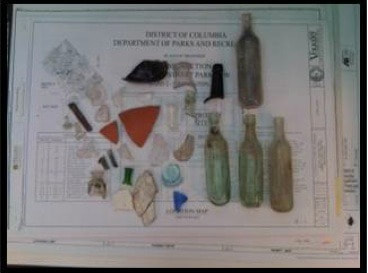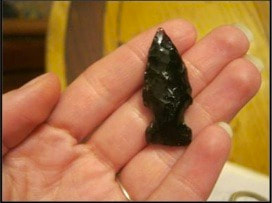|
As a CRM professional, one of the most interesting parts of my job is getting to travel all over the country meeting different people. The real privilege though, is getting to see the amazing collections people have picked up on their farms and backyards, now tucked away into garages, basements, and the occasional coffee table display. But, as wonderful as it is to be able to see these collections, even better would be to know exactly where they came from. Was it on the ground surface? Deeply buried? Near a creek on the property or near an old fence line? In archaeology, context is everything—where an artifact came from can provide us with vital information about what was going on in a specific area at a given time. So, what should you do if you find something on your property? Artifacts that are found on private land belong to the landowner, but you can help contribute to the archaeological record! The first step is to leave it in the ground, so archaeologists can get the necessary information about its context. The next step is to tell us! In DC, you should report artifacts and sites to Ruth Trocolli, City Archaeologist ([email protected]) or Chardé Reid, Assistant Archaeologist ([email protected]). Historic artifacts found in DC. Image courtesy of DC Archaeologist Ruth Trocolli As the above picture demonstrates, objects that may not seem important, such as colored shards of glass, bottles, and broken ceramic sherds can provide archaeologists with useful information to date a site. Once archaeologists have this information, they might be able to tell you a lot about the history of your property! And, if it is determined that the artifacts constitute an archaeological site, you might be able to help name and register the site. Remember, if you find something you think might be an artifact, stop digging and call someone. And, of course, it is illegal to dig or remove artifacts from parks and all public land. Also, never buy or sell artifacts! Once the contextual information is lost, it can never be recovered. Another great reason not to buy artifacts—this dates to 2013, not the Early Archaic. If you happen to have a family collection that has been passed down through the years and now no one can tell you where it came from in the first place, it is still worth having an archaeologist have a look at it—this article from the New Haven Independent earlier this month details how a private collection of Ecuadorian artifacts from a home in the area will travel thousands of miles back to their home country and be placed in a museum there-- If you love archaeology, and haven’t been fortunate enough to find anything on your property, or like me you live in an apartment, there are still many volunteer opportunities in the area where you can learn both about the history of the region and about the methodology of an archaeological excavation. At Colchester, volunteers take part in excavation and lab work of Old Colchester. Check out http://cartarchaeology.blogspot.com/. Likewise, the Archaeological Society of Virginia offers talks, classes, and volunteer opportunities for anyone who wants to learn more about archaeology in the area: http://www.asv-archeology.org/index.html. Written By: Sara Ayers-Rigsby, MA, RPA Sara Ayers-Rigsby is an archaeologist based in Virginia, where she has been working for EBI Consulting for nearly five years. Her work for EBI’s cultural resources team takes her all over the country. Her research interests include archaeology in the Mid Atlantic, where she spends most of her time in the field pondering how anyone could have been hardy enough to make points out of locally available materials like rhyolite or hornsfels. Prior to working for EBI, she worked for other CRM firms in the Mid Atlantic, Midwest, and the United Kingdom. She always wanted to be an archaeologist, so she moved to Dublin, Ireland at 18 to study classical archaeology, and, after receiving her degree from Trinity College, Dublin, in 2005, she moved to the University of Bristol and received her M.A. in 2007. To this day, anything she has found in the field pales to the private collections she has come across.
0 Comments
Leave a Reply. |
|


